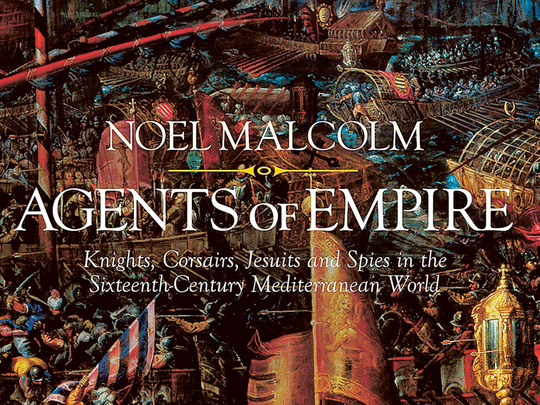
Agents of Empire
By Noel Malcolm, Oxford University Press, 640 pages, $35
Since at least the Greeks, history has been written by the victors. It is only relatively recently that the so-called “history from below” has challenged the winners’ stories with alternative histories of the “losers”, those people and places deemed unworthy of mention.
A rich, neglected archive of the lives of those usually lost to history has been unearthed as a result. But what of the go-betweens, the diplomats, spies, soldiers, priests and interpreters who act as intermediaries in the great historical dramas of a period such as the Renaissance?
These people are the glue of history. They are often mentioned in passing but then disappear, their voices lost in the dense thicket of conflicting documents written in decaying and often coded manuscripts in a formidable array of languages.
In “Agents of Empire”, Noel Malcolm has pulled off the quite miraculous feat of combining the stories of late 16th-century Europe’s winners and losers with those of its mediators, in the form of knights, pirates, priests and spies, written not from the metropolitan perspective of Rome, Seville or even London, but from the viewpoint of Albania and the Adriatic coastline, which stretches southwards from modern-day Croatia to Greece.
Albania might not seem the most promising place from which to write a history of the Mediterranean but, as Malcolm argues in this magisterial account, it is the forgotten frontier where East and West, Muslims and Christians, Italians and Turks met, clashed, sometimes fought, but more often than not tried to accommodate each other.
Albania was a porous border zone where religion — from Catholicism and Protestantism to Islam and Judaism — shaped people’s lives but did not necessarily define them, and where prosperity or even basic survival meant changing repeatedly one’s religious, political and commercial allegiances to meet the needs of a world ruled one day by the Venetians and by the Ottomans the next.
In weaving together all these strands, Malcolm follows the lives of two related Albanian families, the Bruni and Bruti. His story begins in the Adriatic city of Ulcinj in modern-day Montenegro, which in the early 16th century was one of the last frontiers of Venetian territory bordering the Ottoman Empire, and home to the merchant, diplomat and “fixer” Antonio Bruti.
Born in 1518, Antonio thrived in a world of “cross-border connections, where personal trust could easily trump official enmities”, acting as an intermediary between Venice and Istanbul, overseeing the vital trade in grain and manipulating a complex web of Christian-Ottoman personal connections and alliances that make a nonsense of the divide between the two cultures that has traditionally characterised our understanding of the Renaissance.
In acknowledgement of his loyalty and achievements, Antonio the Venetian Doge made Bruti a knight of the Order of St Mark in 1559. But he was not the only member of the clan to prosper in this fluid world. Over the next 40 years his relatives would fan out across Italy, the Balkans and the Ottoman lands in pursuit of commercial profit, religious zeal and political preferment that would bring them great influence, but which was often purchased at a terrible personal cost.
One brother-in-law, Giovanni Bruni, pursued his calling through the church, rising to become archbishop of Bar, confronting the problem of a diocese straddling Ottoman territory and competition from the rival Greek Orthodox and Lutheran faiths.
Giovanni’s position working at the front line against the church’s various perceived “heresies” brought him to the attention of the papacy, who in 1562 called him to address the great Counter-Reformation Council of Trent (1545-63), the Catholic church’s attempt to put its house in order and respond to the challenge of Protestantism.
While Giovanni pursued a religious calling, his brother Gasparo took up the sword and joined the Knights of Malta in 1567, just as the new Ottoman sultan, Selim II, threatened another major naval campaign against Malta and Spanish-Venetian interests throughout the Mediterranean. With the Ottomans on the warpath, Ulcinj fell to them in the summer of 1571.
For many of the family the Ottoman invasion was a disaster: Antonio was killed and Giovanni was enslaved in the Turkish galleys, but Gasparo became second in command of a Christian naval alliance that confronted the Ottoman fleet in October 1571.
In one of the book’s most dramatic moments, Malcolm vividly re-creates the Battle of Lepanto, at which Giovanni was killed, probably only 90 metres away from his brother on board the papal flagship, although not at the hands of the Turks but marauding Spaniards, who cut him down as he pleaded: “I’m a bishop, I’m a Christian.’”
Like the fall of Ulcinj, Lepanto took a heavy toll on the Bruni and Bruti families, but some of Gasparo’s nephews survived and continued the tradition of East-West intermediaries, acting as dragomans or interpreters to both sides. Bartolomeo Bruti applied to work for the Venetians in Istanbul, and soon fell into the pay of the Spanish and the Venetians as a spy, brokering deals with the Ottoman Grand Vizier (who as luck would have it was a relative), and becoming involved in the appointment of the Voivod (princely ruler) of the Ottoman client state of Moldavia.
In 1592, when a new Voivod was appointed, Bartolomeo became surplus to requirements, and was promptly strangled and dumped into the River Dniester (although Malcolm discovers another dimension to his murder, an altogether more prosaic squabble over money). His uncle Gasparo was rewarded for his bravery at Lepanto with a command in the late 1570s to defend the papal enclave of Avignon from another heretical foe, this time the French Protestant Huguenots.
He sent his son, Antonio, to a Jesuit school in Rome where he trained in law, and by the 1580s was helping his cousin Bartolomeo administer Moldavia. The clan’s influence even reached as far as Queen Elizabeth I’s agents.
In 1596, Edward Barton, the English ambassador in Istanbul, travelled with the Ottoman sultan Mehmed III through Hungary with his dragoman: Pasquale Bruti, a nephew of Bartolomeo’s. Unfortunately, Pasquale suffered a similar fate to that of his uncle, murdered by the Ottoman authorities in Belgrade in 1597 on suspicion of being a spy.
The lives of the Brunis and Brutis and the history they disclose are remarkable enough, but more so because of the extraordinary feat of scholarship undertaken by Malcolm to unearth them. Malcolm stumbled across the Brunis nearly 20 years ago while reading a 16th-century Italian book on the Ottomans. It led to a paper chase across archives ranging from Britain to Italy and the Balkans, and involved consulting thousands of manuscripts and texts in Albanian, Serbo-Croat, Macedonian, Romanian and, as Malcolm puts it rather modestly, “various West European languages”.
Traditionally, the story of 16th-century Europe and the Mediterranean has been told according to the Greco-Roman intellectual heritage, which meant that most scholars with a grasp of Greek and Latin understood the Renaissance as beginning somewhere to the west of Istanbul (or Constantinople) in the 15th century and ending in Tudor England at the beginning of the 16th century. Places such as the Ottoman territories in Eastern Europe, including Albania, were simply not regarded as being of interest, nor were scholars equipped to understand the mine of archival material they contained. (Even Malcolm apologises for possessing only “a basic reading knowledge of modern Turkish”.)
The problem was compounded by the Cold War, where the Iron Curtain that fell across Eastern Europe also prevented historians from reassessing the role of places such as Poland and Hungary in a 16th-century Renaissance that had no conception of the divisions that would scar Europe for so many subsequent centuries.
There are very few scholars with Malcolm’s linguistic skills and historical vision, which is one of the many reasons “Agents of Empire” is such an important book. It opens up new vistas of research into the hinterland of Renaissance Europe, moving the period’s centre of gravity eastwards and away from Italy, precisely at a time when recent events in and around Turkey may prove to be decisive in the next phase of Mediterranean history.
But beware: Malcolm’s formidable scholarship takes few prisoners, and his extended digressions on the circulation of news, the history of the grain trade, piracy, galley warfare and espionage may test the patience of the casual reader. This is no beach read — unless you are heading for the Albanian Riviera. Who knew that 16th-century Albania could be so interesting?
–The Telegraph Group Limited, London 2015
Jerry Brotton’s “This Orient Isle: Elizabethan England and the Islamic World”, will be published in 2016









